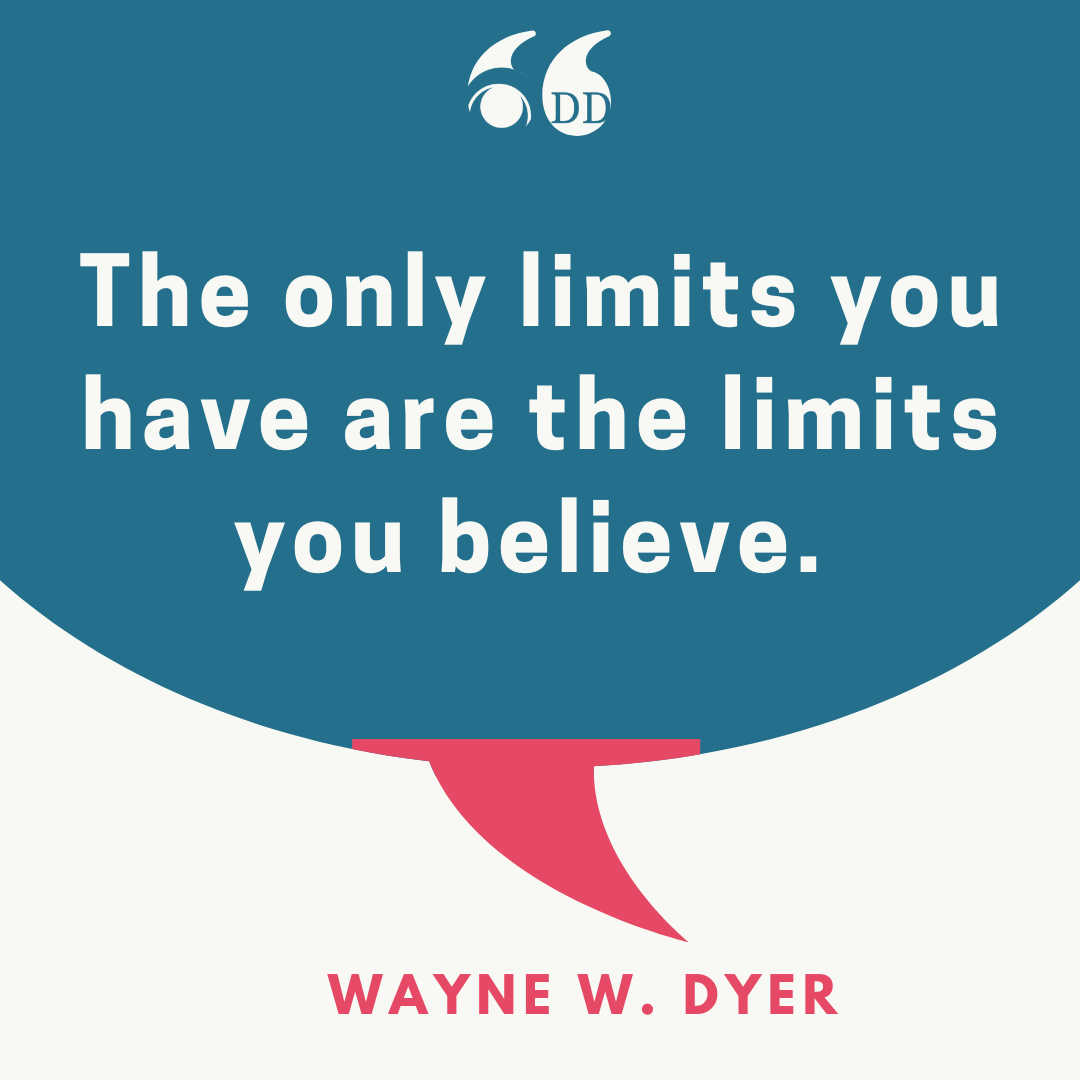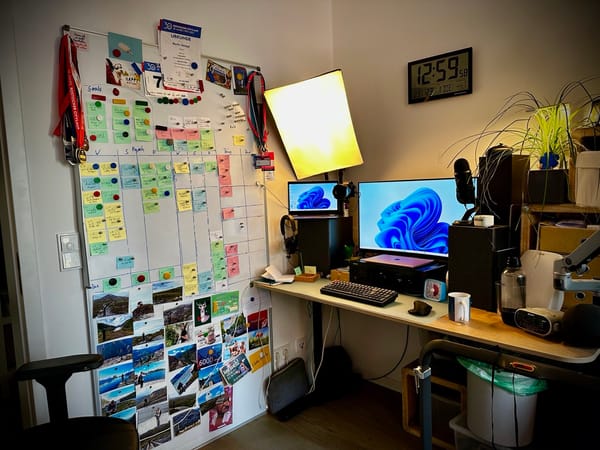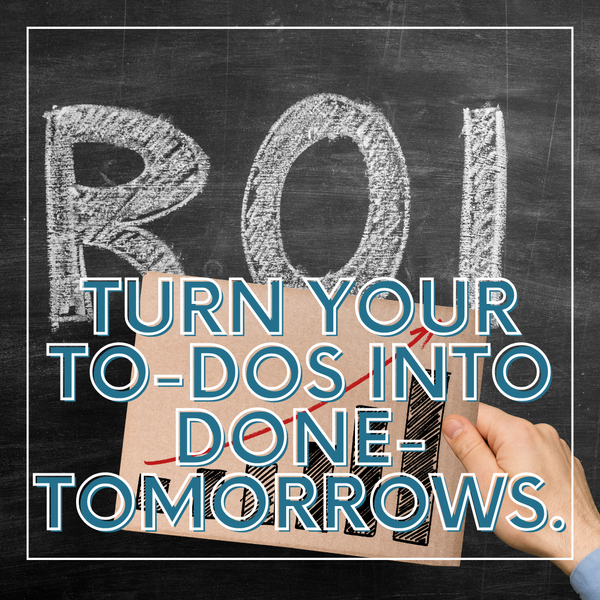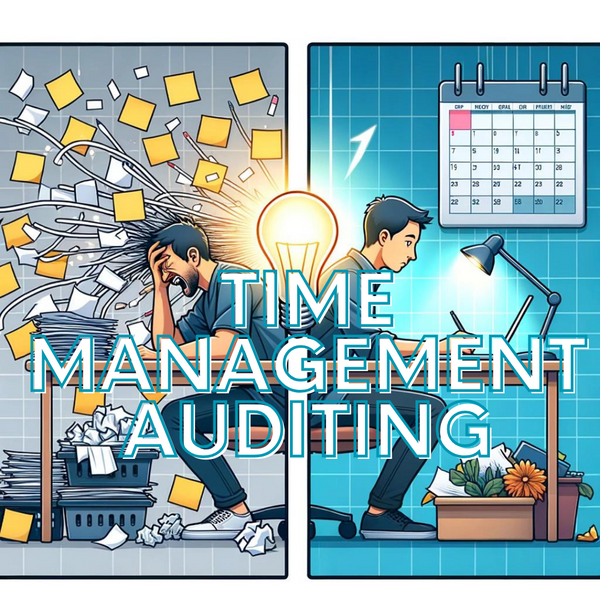Diligent Sunday Newsletter / Issue #22 about the Top 16 Limiting Beliefs in the Corporate World
Explore top limiting beliefs in the corporate world with Diligent Sunday's Issue #22. This edition sheds light on common misconceptions, offers methods to overcome them and delves into updates on Martin's upcoming "4hr Workday Protocol" book. Enrich your corporate journey with this insightful read.

Introduction
Dear Diligent Sunday Readers,
Another week has passed, and we find ourselves in the 31st week of the year, with 57.7% of the year gone by. I have returned from my summer vacation with renewed energy, and over the past weeks, I've devoted 1-2 hours each day to working on my book.
In "The 4hr Workday Time Master Protocol", I aim to explain how Corporate Knowledge Workers can shift their focus from busy 40 or even 60-hour workweeks to a more effective 20-hour workweek. This allows them to allocate the remaining time and energy to more enjoyable pursuits such as health, innovation, passion projects, quality family time, or building a lucrative side hustle—something I am currently attempting.
I have completed approximately 30-40% of the book, and today, I would like to share a glimpse of one of the early chapters. Before diving into practical methods, I address mindset-related aspects. For example, I explore typical limiting beliefs prevalent in the corporate world, which I've encountered during my nearly 12-year career.
The chapter itself is too long to share in a newsletter, so I'll try to present its essence as a listicle-style article further below.
I'd be delighted if you could share any other limiting beliefs or absurdities from the corporate world that you know. Feel free to send me tips via email or leave them in the comments below. Incorporating these insights will enrich the chapter even further.
Best regards and I wish you an outstanding start to the coming week,
-- Martin
P.S.: For those interested in the behind-the-scenes details – Here's my plan:
- I'll first write my "4hr Workday Protocol" Time Mastery concept as a book (I estimate around 50-70k words) to clarify the concept for myself. It's one thing to have an idea abstractly in one's mind, but it's another challenge to put it concretely on paper in a way that makes sense to others.
- I'll offer the book on Kindle Unlimited or similar platforms for free or at a low cost of 1-2 dollars.
- I'll create shorter 10-pager module pieces from the book that I'll offer for free on my blog.
- Furthermore, I plan to turn the book into modules for a video course, which will be the actual main source of revenue (priced around 149€ or similar to what Justin Welsh does).
Let's see if it unfolds, as I hope! Writing alone is a lot of fun, and since I started deriving my social media posts from my book content, my social media growth has significantly improved. I'll keep you updated on my progress!
Quote of the day

Today at a Glance:
We discuss Limiting Beliefs with a focus on the ones the Corporate World:
- 1️⃣ The Why: Why is it essential to explore and confront Limiting Beliefs, both personal and societal?
- 2️⃣ The How: How can we resist Limiting Beliefs and discover them within our thought patterns?
- 3️⃣ The What: Here are the top 16 Limiting Beliefs prevalent in the corporate world.

1️⃣ The Why: Why is it essential to explore and confront Limiting Beliefs, both personal and societal?
As we embark on this journey of unravelling the limiting beliefs that pervade the corporate world, you might wonder why we're delving into this topic in the first place. Well, the answer is simple – confronting and understanding these limiting beliefs is the key to unlocking a more fulfilling and purposeful life.
In the corporate landscape, these beliefs often act as invisible barriers that hold us back from reaching our true potential. They whisper in our minds, "You can't do that," or "That's just the way things are," discouraging us from pursuing our passions and dreams. These insidious thoughts not only stifle our creativity but also prevent us from challenging the status quo and finding better, more efficient ways of working.
We open ourselves up to new possibilities and opportunities by exploring and questioning these beliefs. We start to see that the constraints we once thought were real are often just illusions, mere products of our conditioning and societal norms. As Wayne Dyer wisely said, "The only limits you have are the limits you believe." We can tap into our true potential and achieve greatness by breaking free from these self-imposed constraints.
Moreover, societal limiting beliefs can be just as damaging. We've all heard them before – "You have to work long hours to be successful," or "You can't have work-life balance and be ambitious." These collective beliefs create a culture that glorifies overwork and disregards the importance of rest and personal well-being.
Addressing these limiting beliefs is not about promoting laziness or shirking responsibilities; it's about finding a better balance and realizing that our worth is not solely tied to our productivity. Challenging these beliefs paves the way for a healthier, more sustainable approach to work and life.
We have to become more mindful and intentional in our choices. We gain the power to redefine success on our terms and design a life that aligns with our values and passions.
So, let's explore these limiting beliefs with curiosity and open-mindedness. Let's challenge the assumptions that have been holding us back and create a corporate culture that fosters growth, innovation, and well-being.
Together, we can transform how we work and live, one belief at a time.
"Believe you can and you're halfway there."
- Theodore Roosevelt

2️⃣ The How: How can we resist Limiting Beliefs and discover them within our thought patterns?
Resisting and uncovering limiting beliefs within our thought patterns is not a quick-fix solution but a journey of self-exploration and continuous learning. Here are some actionable steps you can take to commence this transformative journey:
- Identify Limiting Beliefs: Start by being attentive to your self-talk. Pay attention to the narratives that run through your head when you're faced with a new challenge or opportunity. The moment you catch yourself thinking things like "I can't do this," "I'm not good enough," or "This is impossible," you've discovered a limiting belief. Writing these down in a journal can help make these patterns more apparent over time.
- Question the Beliefs: After identifying a limiting belief, challenge it. Is it based on facts, or is it just an assumption? What experiences led you to have this belief? Are these experiences universally true, or are they subjective? Engaging in such critical thinking helps to dismantle the stronghold these beliefs have over your mind.
- Reframe the Narrative: For every limiting belief, there's an empowering belief waiting to replace it. Reframing is the act of changing the way you interpret a negative thought. Instead of thinking, "I can't handle this project; it's too complex," you could reframe it as, "This project is challenging, but it's an opportunity to learn and grow."
- Positive Affirmations and Visualization: Regularly affirming positive statements and visualizing your success can help overwrite limiting beliefs. For instance, visualizing yourself accomplishing tasks efficiently within a 4-hour workday can reinforce the belief that it's possible.
- Expand Your Exposure: Sometimes, we limit ourselves because we're not aware of what's possible. By seeking new experiences, learning new things, and meeting diverse people, we can broaden our perspectives and break free from limiting beliefs.
The goal is not to eliminate all negative thoughts (that's unrealistic) but to develop resilience not to be hindered by them. You're bound to face challenges and doubts along the way, but each time you do, remember Theodore Roosevelt's words, "Believe you can, and you're halfway there." Because you truly are. You're capable of much more than what your limiting beliefs allow you to think.
"Whether you think you can, or you think you can't, you're right."
- Henry Ford

3️⃣ The What: Here are the top 16 Limiting Beliefs prevalent in the corporate world.
The corporate world is full of misconceptions and limiting beliefs that can hinder productivity and individual satisfaction. From the belief that someone else needs to solve a problem to the idea that collaboration is always the best approach, these misconceptions can lead to wasted time and energy. This listicle will explore some of these limiting beliefs and offer ways to overcome them.
"Someone needs to do something!"
One common misconception in the corporate world is the belief that someone else needs to solve a problem. This belief often arises from a rigid view of roles and responsibilities. Employees become locked into their specializations and fail to recognize that they are capable of solving exceptional problems.
To combat this misconception, employees should embrace a more generalist approach and take responsibility for solving problems that they notice. By stepping beyond their specialization, they can address problems more effectively and prevent unnecessary escalations. Embracing a problem-solving mindset can lead to career advancements and increased productivity.
"This doesn't fit my schedule", and "I didn't cause this problem."
Another limiting belief in the corporate world is the idea that employees should stick to their predefined schedules and avoid new issues or challenges. This mindset leads to pseudo-productivity and busyness thinking. Urgent and important issues often carry a higher output value than originally planned tasks.
By refusing to address these new tasks, employees are not working on essential tasks, hindering their productivity. It's important to be flexible and adaptable to new challenges and not cling to rigid schedules.
"Someone up there must have thought this through."
In larger organizations, there is often a lack of transparency about decision-making processes. Employees may believe that those at the top of the organizational pyramid have carefully considered everything happening at the base.
However, this is often not the case. Organizations are more like a network of islands than a pyramid; problems and nonsensical behaviours can go unnoticed by those at the top. It's important for employees at all levels to recognize that they have agency and responsibility for solving problems or bringing them to light.
By identifying and addressing problems, employees can contribute to the overall productivity and success of the organization.
"The CEO is the top decision-maker."
Another common misconception is that the CEO is the ultimate decision-maker in an organization. While the CEO may have final approval on certain decisions, important decisions are often made collaboratively and require broad support.
The approval of the formal decision-maker is just the final step in the decision-making process. It's important to involve stakeholders and gather input before making important decisions.
"They have decided", "They want", or "I am not the decision-maker."
Many employees in project roles distance themselves from decision-making and feel unempowered. They may say things like "They have decided" or "they want" without taking ownership of collaborative decisions they actually were part of.
Risk aversion can lead to a lack of progress and indecisiveness. Employees in project roles should take responsibility for joint decisions and stand by them.
"Collaboration is always good and right."
There is a prevailing belief that collaboration is always beneficial and should be pursued at all costs. However, collaboration can be time-consuming and inefficient if not used judiciously.
It's important to recognize that collaboration should be a tool used when necessary, not the default approach to every problem. Employees can avoid unnecessary collaboration and increase productivity by considering other options and focusing on value creation.
"I accept the decision, but I do not support it."
Another problem is that employees accept a decision grudgingly but don't fully support them. This lack of commitment can lead to confusion and a lack of direction within the organization.
Employees must voice their concerns and engage in constructive discussions before making decisions. But once a decision is reached, all stakeholders should commit to it to provide clarity and direction.
"They know what they're doing, I'll withhold my opinion."
In group situations where decisions need to be made, it's common for employees to hold back their opinions if they think others support a certain decision.
This silence can lead to a lack of critical thinking and a failure to consider alternative perspectives. Employees need to voice their opinions and contribute to the decision-making process to ensure that all possibilities are explored.
"It's the job of leaders to guide and decide."
The belief that leaders should make all significant decisions for an organization can lead to a lack of initiative and productivity among employees.
Employees need to take ownership of their work and make decisions when necessary. Employees can demonstrate their value and contribute to the organisation's success by being proactive and taking responsibility for decisions.
"The company will reward my good work handsomely."
Many employees have the misconception that their hard work will be rewarded with significant salary increases. While exceptional work may be recognized, salary increases are often limited and gradual.
Employees need to manage their expectations and focus on producing high-quality work rather than expecting a linear correlation between effort and salary.
"In case of uncertainty, I schedule a meeting."
Meetings can often be a significant drain on productivity, especially when they are used as a way to avoid dealing with uncertain or challenging situations. Instead of finding a direct solution, employees may schedule a meeting to discuss the issue, effectively pushing it off and prolonging the decision-making process.
It's important to recognize when a meeting is necessary and when it can be avoided to find a more immediate solution.
"First, request approval and budget."
In some organizations, there is a tendency to seek approval and budget before taking any action. While this may seem like the proper procedure, it can often lead to unnecessary delays and wasted time.
Instead of waiting for approval, employees should try to solve problems directly with their available resources. By taking the initiative and finding solutions independently, employees can save time and increase their productivity.
"Keep it secret."
The idea of keeping information secret can be detrimental to productivity and collaboration within an organization. When knowledge is hoarded, important information may be forgotten or overlooked, leading to duplicated efforts and wasted time.
It's important to be open and transparent with information that can be helpful to others. By sharing knowledge and working collaboratively, employees can increase efficiency and avoid unnecessary work.
"I feel responsible only for the process."
In the corporate world, there are two types of knowledge workers: those who focus solely on the process and their tasks within it and those who take a more holistic approach and focus on the outcome.
While both types have their place in organizations, employees who embrace outcome responsibility tend to be more valuable and fulfilled in their roles.
By thinking about the bigger picture and taking ownership of outcomes, employees can contribute more effectively to the organization's success.
"I don't want to become unpopular."
Fear of being unpopular can often lead employees to engage in behaviours that are not beneficial to their productivity or the organization as a whole. This fear can manifest differently, such as being a "Yes-Man" or avoiding critical discussions.
It's important to prioritize productivity and focus on what will contribute to the organization's success, even if it means challenging ideas or taking actions that may not be popular with everyone. Being willing to take risks and stand up for what is right can lead to greater productivity and colleague respect.
"Collaboration is annoying - I take shortcuts."
While collaboration is not always the best approach for every situation, there are times when it is necessary and beneficial. Employees should be cautious of taking shortcuts and avoiding collaboration altogether.
It's important to strike a balance between working independently and working collaboratively, depending on the nature of the task or problem at hand.
"Our beliefs about what we are and what we can be precisely determine what we can be."
- Anthony Robbins

Wrap-up
That's all for this week. I hope this newsletter on Limiting Beliefs and Corporate World misconceptions was inspiring and helpful for you.
Wishing you an excellent start to the week!
Best regards,
-- Martin





